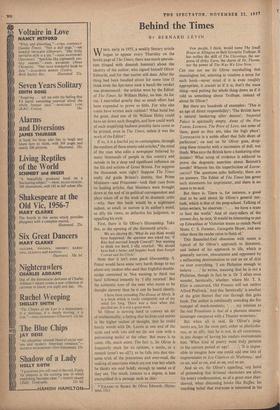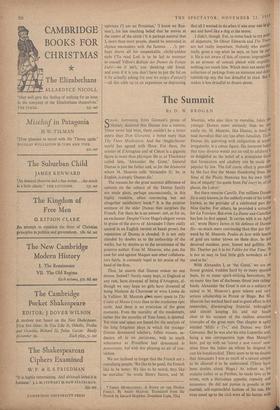Behind the Times
BY BERNARD LEVIN WHEN, early in 1955, a weekly literary article began to appear every Thursday on the books page of The Times., there was much specula- tion (tinged with donnish humour) about the identity of the author, who signed himself Oliver Edwards, and for that matter still does. After the thing had been bandied about for some time (I think even the Spectator took a hand) the verdict was pronounced : the articles were by the Editor of The Times, Sir William Haley, no less. As for me, I marvelled greatly that so much effort had been expended to prove so little. For who else could have written such rubbish? What hand but the great, dead one of Sir William Haley could have set down such thoughts, and how could work of such stupefying badness possibly have come to be printed, even in The Times, unless it was the work of the Editor?
If so, it is a fearful joy to contemplate, through the medium of these ninety-odd articles,* the mind of the man who edits a newspaper believed by many thousands of people in this country and outside to be a deep and significant influence on the life and actions of Great Britain. For suppose the thousands were right? Suppose The Times really did guide Britain's destiny, that Prime Ministers—and Princesses—took their cues from its leading articles, that Ministers were brought down at the nod of its political correspondent and plays taken off at the wink of its dramatic critic —why, then this book would be a nightmare indeed, so small, so narrow is its author's mind, so silly his views, so defective his judgment, so appalling his style.
First, there is Sir Oliver's lifemanship. Take this, as the opening of the thirteenth article :
We are playing Ifs. 'What do you think would have happened,' the question was asked me, 'if Rita had married Joseph Conrad?' Not wanting to think too hard, I idly retorted : 'We should have had a better and happier book than Joseph Conrad and his Circle.'
Note that it isn't even good lifemanship. S. Potter would have some very harsh things to say about any student who used that frightful double- nudge contained in 'Not wanting to think too hard' followed instantly by 'I idly retorted.' But the authentic tone of the man who wants to be thought cleverer than he is can be heard clearly. I have been rereading The House of Mirth. It is a book which is rarely completely out of my mind for long. There was a time when this
puzzled me. It is not a great work. . . .
Sir Oliver is striving hard to convey an air of intellectuality, a feeling that he lives and moves in the higher realms of thought, that he could bandy words with Dr. Leavis at one end of the scale and with you and me (in our case with a patronising smile) at the other. But more is to come. Oh, much more. The fact is, Sir Oliver is frequently stuck for an opinion, a simile, or a remark (aren't we all?), so he falls into that tire- some trick of the precocious and over-read, the making of assertions which are not true but which he thinks are said boldly enough to sound as if they are. The result, fatuous to a degree, is best exemplified in a passage such as this :
* TALKING OF BOOKS. By Oliver Edwards. (Heine- man, 21s.)
Few people, I think, would name The Small House at Allington as their favourite Trollope. It has neither the skill of The Claverings, the sus- pense of Orley Farm, the charm of Dr. Thorne, nor the power of The Way We Live Now.
Can one not see Sir Oliver marshalling that meaningless list, selecting at random a noun for each book—never mind if it is even roughly appropriate, it sounds as if it is, that's the main thing—and putting the whole thing down as if it told us something about Trollope, instead of about Sir Oliver?
But there are hundreds of examples : 'This is an age of direct responsibility'; 'The British have a natural hankering after dozens'; 'Imperial Palace is spiritually empty. Anna of the Five Towns, Leonora, The Price of Love, can none of them, good as they are, take the high place'; 'Lorenzaccio is a noble effort that falls short of perfection'; on and on Sir Oliver goes, drop- ping these remarks with a succession of dull, wet thuds. Who says the British have a hankering after dozens'? What scrap of evidence is adduced to prove the dogmatic, assertion about Bennett's novels? Wherein lies the imperfection of Loren- zaccio? The questions echo hollowly; there are no answers. The Editor of The Times has given such statements his imprimatur, and there is no
more to be said.
But there is. There is, for instance, a good deal to be said about Sir Oliver's general out- look, which is that of the prep-school. Talking of letter-writers, he observes : . . we have a team
to beat day, world.' And of story-tellers of the present day, he says, 'It would be interesting to put up Edwardian or Victorian teams to match Nevil Shute, C. S. Forester, Georgette Heyer, and any other three the reader cares to think of.'
This flannelled-fool obsession with teams is typical of Sir Oliver's approach to literature, and indeed of his approach to life, which is generally narrow, obscurantist and oppressed by a suffocating determination to cast an air of dim vu over everything. 'I am Philistine enough to believe . . .' he writes, meaning that he is not a Philistine, though in fact he is. Or 'I often even wonder, heretically, whether, where Mr. T. S. Eliot is concerned, Old Possum will not outlive Alfred Prufrock.' And this 'heretically' is another of the grim themes that run through this grim book. The author is continually sounding the flat
trumpet of mock-modesty; . . my relation to the real Proustians is that of a pleasure steamer passenger compared with a Thames waterman.'
But when all is said, Sir Oliver's judg- ments arc, for the most part, either so platitudin- ous, or so silly, that he is not, in all conscience, in any danger of having his readers overestimate him. 'What kind of poetry most truly pertains to the current period or age? . . .'; `It is impos- sible to imagine how one could add one iota of improvement to Les Caprices de Marianne,' and so on, and so on, and so on, and so on.
And so on. Sir Oliver's appalling, coy habit of pretending that fictional characters are alive, his weary condescension, as of a great man shirt- sleeved, when discussing books like Raffles, his touching belief that everyone is interested in his opinions ('I am no Proustian,' I know no Rus- sian'), his less touching belief that he moves at the centre of the circle ('It is perhaps natural that 1, more than most people, should be interested in chance encounters with the famous . . .'); per- haps above all his unspeakable, clich&sodden style ('To read Loti is to be led to murmur to oneself Villon's Ballade des Dames du Temps Jadis'—no it isn't, you shocking old fraud, and even if it is you don't have to put the lid on it by actually asking Oft sont les neiges d'antan?) —all this adds up to an experience so depressing that all I wanted to do when it was over was to g° out and howl like a dog at the moon. I didn't, though. For, to come back to my point of departure, Sir Oliver Edwards and The Tinles are not really important. Nobody who matters really gives a rap what he says, or how he Ws it. He is not aware of this, of course; impregnable in an armour of conceit plated with stupidity. nothing can touch him. Which does not make this collection of pickings from an immense and dust?' rubbish-tip any the less dreadful tO read. But it makes it less dreadful to dream about.











































































 Previous page
Previous page